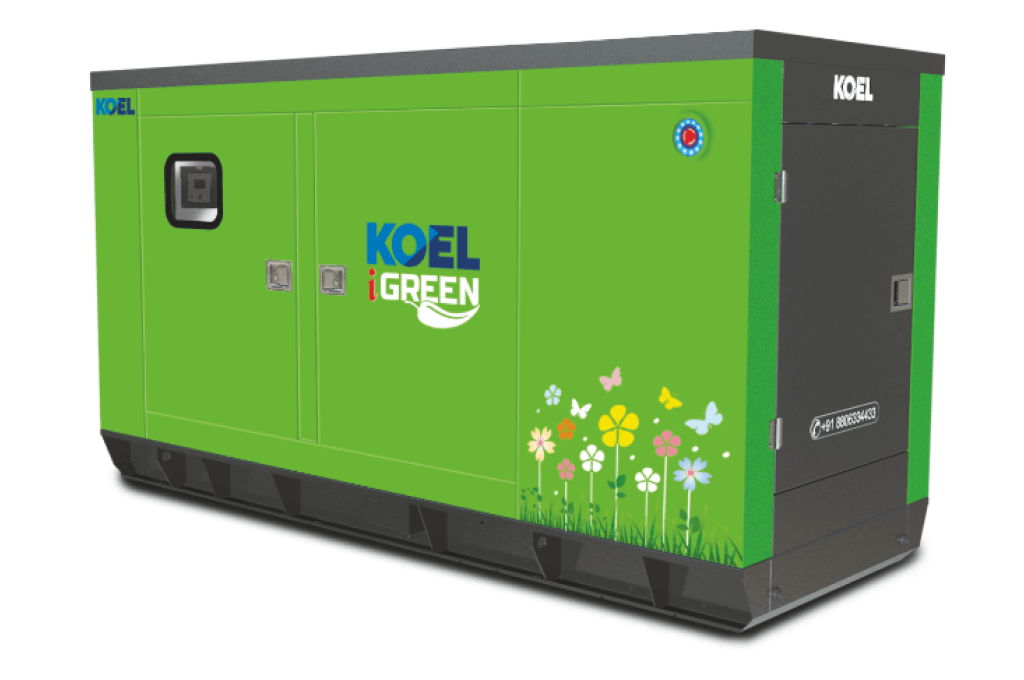Gensets
- Home
- Gensets

Brands
- KOEL
- CUMMINS
- & Many More
Gensets, short for generator sets, are self-contained power generation units that provide backup electricity during power outages or in areas without access to the main power grid. These robust machines are equipped with an engine, typically fueled by diesel, natural gas, or gasoline, and an alternator that converts mechanical energy into electrical energy. Gensets are essential in various sectors, ensuring uninterrupted power supply for critical operations, emergency situations, and remote locations. Let’s explore the functionalities, types, applications, and benefits of gensets in powering resilience and stability.
Functionalities of Gensets:
Emergency Power Supply: Gensets are designed to kick in automatically or manually during power outages or blackouts, providing emergency electricity to maintain essential services.
Standby Power Source: Gensets act as a standby power source for critical facilities, such as hospitals, data centers, and communication networks, preventing disruptions and ensuring continuous operations.
Prime Power Generation: In remote areas or regions with unreliable grid supply, gensets serve as the primary power source, independently meeting the electricity demands of the location.
Types of Gensets:
Diesel Gensets: Diesel gensets are widely used for their durability, high fuel efficiency, and reliable power output. They are suitable for both standby and prime power applications and are commonly employed in industrial settings, commercial buildings, and construction sites.
Natural Gas Gensets: Natural gas gensets utilize clean-burning natural gas as fuel, making them an environmentally friendly option. They are ideal for continuous operation and are often used in combined heat and power (CHP) systems for energy-efficient applications.
Gasoline Gensets: Gasoline gensets are portable and suitable for small-scale power requirements. They are commonly used for camping, outdoor events, and as emergency backup for residential applications.
Biogas Gensets: Biogas gensets utilize biogas produced from organic waste or anaerobic digestion as fuel. They offer a sustainable and renewable energy solution, especially in agricultural and waste management settings.
Hybrid Gensets: Hybrid gensets combine multiple energy sources, such as solar or wind power, with traditional fuel sources, providing a more flexible and sustainable power solution.
Applications of Gensets:
Critical Facilities: Hospitals, data centers, banks, airports, and emergency services rely on gensets to maintain continuous operations during power failures, ensuring uninterrupted services.
Industrial Operations: Industries with continuous production processes, such as manufacturing, mining, and oil and gas, utilize gensets to avoid costly production stoppages.
Construction Sites: Gensets are commonly used on construction sites to power equipment, tools, and temporary facilities, where grid power may not be readily available.
Telecommunication Towers: Gensets provide backup power to telecommunication towers, enabling consistent network connectivity even during extended power outages.
Remote Areas: In remote locations without access to the main power grid, gensets are crucial for providing electricity for communities, agricultural activities, and infrastructure.
Benefits of Gensets:
Reliability and Resilience: Gensets offer reliable and immediate power backup during emergencies, ensuring continuity of critical operations.
Versatility: Gensets can be customized to fit various power requirements and fuel sources, making them adaptable to diverse applications.
Rapid Response: Gensets can start and provide power within seconds of a power outage, preventing disruptions and minimizing downtime.
Independent Power Source: Gensets offer independence from the main grid, making them invaluable in remote or off-grid areas.
Environmental Considerations: Natural gas and biogas gensets offer cleaner and greener power options, reducing greenhouse gas emissions and environmental impact.
Energy Efficiency: In combined heat and power (CHP) applications, gensets increase overall energy efficiency by capturing and utilizing waste heat for various purposes.
Cost-Effectiveness: While the initial investment may be higher, gensets can lead to cost savings by reducing losses due to power outages and expensive production downtime.
Challenges and Future Developments:
Despite their many benefits, gensets face some challenges that the industry is actively addressing:
Environmental Impact: Traditional diesel gensets emit pollutants and greenhouse gases, prompting the need for cleaner and more sustainable alternatives.
Fuel Supply and Availability: Gensets relying on traditional fuels may face supply and price fluctuations, especially in remote areas.
Noise and Vibration: Gensets can produce noise and vibrations, which can be a concern in residential areas and noise-sensitive environments.
Storage and Handling of Biogas: Utilizing biogas as fuel requires appropriate storage and handling infrastructure, which may pose challenges in some settings.
Gensets play a pivotal role in powering resilience and stability in various industries and applications. From providing emergency backup to critical facilities to serving as a primary power source in remote areas, gensets ensure uninterrupted power supply, boosting productivity.


